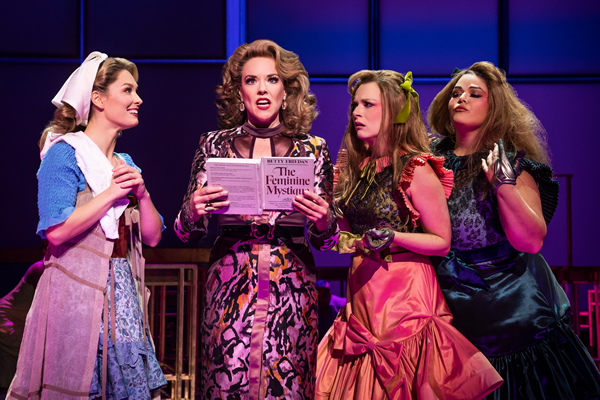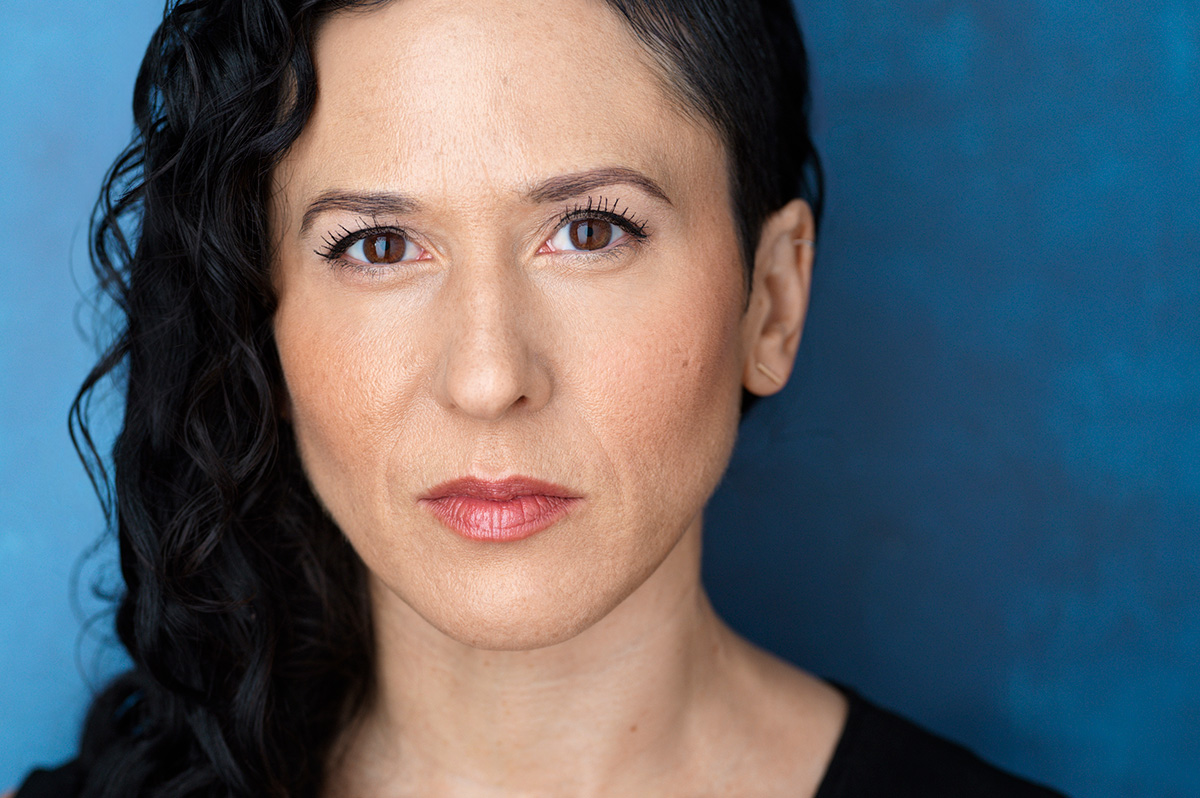Theater
New theater: ‘Pretty Woman’ and it’s Britney, bitch
Two musicals to check out on D.C. stages

After publication of this story, the theater announced that all performances of “Pretty Woman” have been canceled due to COVID.
Tony Award-winning choreographer/director Jerry Mitchell has had a long and loving relationship with the film “Pretty Woman.”
In a recent phone call, he recalls, “When I first saw the movie, I was dancing in ‘The Will Rogers Follies’ in the early 90s. It was the perfect Cinderella story, and I fell in love.”
From the start, Mitchell harbored the idea that “Pretty Woman” would make a good musical. And 30 years later, after successfully directing and/or choreographing movies to Broadway musicals (“Hairspray,” “Kinky Boots,” “Legally Blonde,” and “La Cage,” to name a few), Mitchell met “Pretty Woman’s” director, Gary Marshall, who asked him to tackle an adaptation of the popular flick that made Julia Roberts a star.
It wasn’t a hard choice for Mitchell, 61. “Pretty Woman” is essentially a two hander about unlikely couple Edward Lewis and Vivian Ward, a wealthy businessman and free-spirited prostitute, who find happiness together against the odds. Despite the trite aspects of the story, Mitchell sees more to it than that. “She’s in the ashes but gets herself out by finding some self-worth. It’s a good female empowerment story that I’d like to tell my own nieces. And we amplify that aspect in the musical.”
Helmed by Mitchell, “Pretty Woman: The Musical” premiered in Chicago before opening on Broadway in 2018, and closing over a year later after a successful run. And in just a few days, the touring production is coming to Washington’s National Theatre.
Mitchell sort of fell into directing movies to musicals. He has an explanation: “I don’t think most people read books like they used to. They watch movies and it’s a faster turnaround. A producer might think ‘this is great source material for a good musical.’ And that’s why I think so many movies are thrown at creative types rather than books.”
Born with a natural athleticism that compliments his dance ability, Mitchell began acting and dancing as a kid in community in theater in his hometown of Paw Paw, Mich. Once in college at Webster University in St. Louis, he immersed himself further in dance and acting, and, says Mitchell, “came out the minute [he] stepped on campus.” He left school early to pursue a professional dance career.
Moving from dancer to choreographer to director isn’t an easy task, he attests. “By 23, I knew that I wanted to be on the other side but I also knew that through dance I’d get to work with some of the great choreographers. And that came true in spades for me: Dancing allowed me to work with people like Agnes de Mille, Michael Bennett, and Jerome Robbins.”
Mitchell, who lives in New York with his fiancé actor Ricky Schroeder (“Not to be confused with Schroder the movie actor – my Ricky is younger and better looking,” says Mitchell), is an integral part of the national tour. He fills the production with people he admires and whose company he enjoys.
“We change up tours, and I like to get in there and do the changes. Also, I’ve had a ball with cast. Adam Pascal who plays Edward sings the shit out of the show. I wanted to give him the time he deserves. And the new Vivian, Olivia Valli (Frankie Valli’s granddaughter), is terrific. She’s brought a sense of humor to the show. The two are sensational together.”

There’s also some empowerment happening at Shakespeare Theatre Company where Broadway bound “Once Upon a One More Time” is making its world premiere. Penned by gay playwright Jon Hartmere, the musical employs familiar fairytale princesses and almost equally familiar Britney Spears’ tunes in telling a story about equality and elusive happiness.
The plot’s premise is promising. A group of fairytale heroines kill time backstage until they’re called on to act out their part when a child somewhere in the world is reading their story. Not surprisingly, Cinderella is the busiest of the storybook stars. She’s also the most dissatisfied. Overworked, underpaid, and not secure in her relationship with Prince Charming, she yearns for more.
Then enters Notorious OFG (Original Fairy Godmother) with a gift in tow – a copy of Betty Friedan’s 1963 bestseller “The Feminist Mystique.” Just what the princesses need to guide them from a life of obedience and dulcet tones to something better. Labor strikes, change, and bold moves ensue.
As Cinderella, standout Briga Heelan boldly leads the large cast as a burgeoning new woman. Justin Guarini makes for a nicely naughty Prince Charming. And amusingly turned out in a sequined mother-of-the-bride dress and sparkly running shoes, Brooke Dillman is more Hollywood’s aw-shucks Jane Withers than the famously abrasive Freidan.
When one of Spears’ more than 20 songs (“Lucky,” “Stronger,” “Toxic,” etc.) drop into the story, fans in the audience ‘ooh and ah’ in recognition and delight. Some fun instances include the Prince’s admission of infidelity with “Oops, I Did It Again,” and Cinderella’s stepmother and stepsisters’ “Work, Bitch.”
Sometimes glittery and loud and other times subdued, the production boasts colorful, witty costumes and artful, first rate projections. But despite good design, stellar voices, and a terrific band, something’s amiss.
And ultimately, as we knew they would, each of the princesses finds their own voice – including the mute Little Mermaid. But despite the occasional cleverness, it’s a tale that never lands. Like the old stories the musical wishes to rewrite, it’s all too predictable.
Theater
‘Andy Warhol in Iran’ a charming look at intersection of art, politics
Mosaic production plumbs kidnapping plot of iconic artist for humor

‘Andy Warhol in Iran’
Through July 6
Mosaic Theater Company at Atlas Performing Arts Center
1333 H St., N.E., WDC
$70
Mosaictheater.org
Behind the blasé veneer, Andy Warhol was more curious than people knew. Particularly when it came to money. He kept a close eye on how the ultra-rich lived, what fellow artists were being paid and who was paying them, and, of course, all the new and more saleable ways of making and selling art.
In playwright Brent Askari’s “Andy Warhol in Iran,” now playing at Mosaic Theater Company, Warhol (Alex Mills) is brought outside of his usual area of interest when he lands face to face with a young revolutionary. While Warhol could be artistically revolutionary, he didn’t connect with the idea of forgoing the pursuit of money and fame for the infinitely more difficult task of achieving social justice.
The 90-minute play is not fully factual, but rather inspired by Warhol’s real life 1976 trip to Tehran to make portraits of the royal Pahlavi family in the waning days of their reign, with a focus on Farah Diba, the Shah’s elegant wife and Iran’s last empress.
The action unfolds in a Tehran hotel suite boasting a glorious view of the snowcapped Alborz Mountains not far from Iran’s vibrant and bustling capital. It’s here, disguised as room service, that Farhad (played by Nathan Mohebbi) gains entrance to Warhol’s rooms, seeking to kidnap the pop art star to garner attention for the university students’ movement.
Warhol meets the armed intruder with a sort of wide-eyed wonderment, flummoxed why he has been selected for abduction. Warhol can’t understand why a young man like Farhad wouldn’t prefer to be paid a big ransom on the spot, or be cast as a star in one of the Warhol Factory flicks.
When Farhad replies it’s because Warhol is the most decadent artist in the world, Warhol mistakenly takes it for the ultimate compliment. After all, his biggest successes had been connected to celebrity and consumerism (think Campbell’s Soup Cans. 1962).
For Warhol, decadence is aspirational. He made portraits of financiers, movie stars, and jet setters. In fact, he’d been obsessed with the lives of the rich and famous since he was a small kid in Pittsburgh thumbing through Photoplay Magazine while bed bound with Saint Vitus Dance.
Accompanying Warhol to Tehran (unseen) are his business manager Fred Hughes, and Bob Colacello, editor of Interview magazine. Together, they make a merry trio of gay social climbers. These kinds of trips were a boon to the artist. Not only did they solidify a new strata of high society contacts, but were also superbly lucrative, thickly padding the painter’s pockets.
While in Iran, Warhol wanted only to view Farah’s vast world-class collection of jewels, sample the caviar on tap, and get his Polaroids. Then he’d fly first class back to New York and transfer the images to silk screen and sell the portraits to the Persian royals at a hefty price. He didn’t foresee any obstacles along the way.
Serge Seiden’s direction is spot on. He’s rendered a wonderfully even two-hander with a pair of terrifically cast actors. And Seiden plumbs the piece for humor mostly drawn from the absurdity of the situation without missing any of the serious bits.
As Warhol, out actor Mills is instantly recognizable as the eccentric artist. He’s wearing the button-down shirt, jeans, blazer, glasses, and, of course the famed shock of white hair wig (here a little more Karen than Andy). His portrayal is better than an imitation. He gives a bit of the fey and confused, but has also infuses him with a certain dynamism.
The energy works well with the intensity of Mohebbi’s would-be kidnapper Farhad. And while it isn’t a romance, it’s not impossible to think that Warhol might fall for a handsome male captor.
The connection between art and politics is almost always interesting; and though not a super deep dive into the era or the life of an artist, “Andy Warhol in Iran” is a compelling, charming, and sometimes funny glimpse into that intersection.
Theater
‘Hunter S. Thompson’ an unlikely but rewarding choice for musical theater
‘Speaks volumes about how sad things land on our country’

‘The Untitled Unauthorized Hunter S. Thompson Musical’
Through July 13
Signature Theatre
4200 Campbell Ave., Arlington, Va.
$47 to $98
Sigtheatre.org
The raucous world of the counterculture journalist may not seem the obvious choice for musical theater, but the positive buzz surrounding Signature Theatre’s production of Joe Iconis’s “The Untitled Unauthorized Hunter S. Thompson Musical” suggests otherwise.
As the titular, drug addled and gun-toting writer, Eric William Morris memorably moves toward his character’s suicide in 2005 at 67. He’s accompanied by an ensemble cast playing multiple roles including out actor George Salazar as Thompson’s sidekick Oscar “Zeta” Acosta, a bigger than life Mexican American attorney, author, and activist in the Chicano Movement who follows closely behind.
Salazar performs a show-stopping number — “The Song of the Brown Buffalo,” a rowdy and unforgettable musical dive into a man’s psyche.
“Playing the part of Oscar, I’m living my Dom daddy activist dreams. For years, I was cast as the best friend with a heart of gold. Quite differently, here, I’m tasked with embodying all the toxic masculinity of the late ‘60s, and a rampant homophobia, almost folded into the culture.”
He continues, “My sexuality aside, I like to think that Oscar would be thrilled by my interpretation of him in that song.
“Our upbringings are similar. I’m mixed race – Filipino and Ecuadorian and we grew up similarly,” says Salazar, 39. “He didn’t fit in as white or Mexican American, and fell somewhere in the middle. Playing Oscar [who also at 39 in 1974 forever disappeared in Mexico], I pulled out a lot of experience about having to code switch before finally finding myself and being confident just doing my own thing.
“As we meet Oscar in the show we find exactly where’s he’s at. Take me or leave me, I couldn’t care less.”
In 2011, just three years after earning his BFA in musical theater from the University of Florida in Gainesville, Salazar fortuitously met Iconis at a bar in New York. The pair became fast friends and collaborators: “This is our third production,” says George. “So, when Joe comes to me with an idea, there hasn’t been a moment that I don’t trust him.”
In “Be More Chill,” one of Iconis’s earlier works, Salazar originated the role of Michael Mell, a part that he counts as one of the greatest joys of artistic life.
With the character, a loyal and caring friend who isn’t explicitly queer but appeals to queer audiences, Salazar developed a fervent following. And for an actor who didn’t come out to his father until he was 30, being in a place to support the community, especially younger queer people, has proved incredibly special.
“When you hear Hunter and Oscar, you might think ‘dude musical,’ but I encourage all people to come see it.” Salazar continues, “Queer audiences should give the show a shot. As a musical, it’s entertaining, funny, serious, affecting, and beautiful. As a gay man stepping into this show, it’s so hetero and I wasn’t sure what to do. So, I took it upon myself that any of the multiple characters I play outside of Oscar, were going to be queer.
Queer friends have seen it and love it, says Salazar. His friend, Tony Award-winning director Sam Pinkleton (“Oh, Mary!”) saw Hunter S. Thompson at the La Jolla Playhouse during its run in California, and said it was the best musical he’d seen in a very long time.
“Since the work’s inception almost 10 years ago, I was the first Oscar to read the script. In the interim, the characters’ relationships have grown but otherwise there have been no major changes. Still, it feels more impactful in different ways: It’s exciting to come here to do the show especially since Hunter S. Thompson was very political.”
Salazar, who lives in Los Angeles with his partner, a criminal justice reporter for The Guardian, is enjoying his time here in D.C. “In a time when there are so many bans – books, drag queens, and travel — all I see is division. This is an escape from that.”
He describes the Hunter Thompson musical as Iconis’s masterpiece, adding that it’s the performance that he’s most proud of to date and that feels there a lot of maturity in the work.
“In the play, Thompson talks to Nixon about being a crook and a liar,” says Salazar. “The work speaks volumes about how sad things land on our country: We seem to take them one step forward and two steps back; the performance is almost art as protest.”
Theater
A hilarious ‘Twelfth Night’ at Folger full of ‘elegant kink’
Nonbinary actor Alyssa Keegan stars as Duke Orsino

‘Twelfth Night’
Through June 22
Folger Theatre
201 East Capitol St., S.E.
$20-$84
Folger.edu
Nonbinary actor Alyssa Keegan (they/them)loves tapping into the multitudes within.
Currently Keegan plays the melancholic Duke Orsino in Folger Theatre’s production of Shakespeare’s romantic comedy “Twelfth Night.” Director Mei Ann Teo describes the production as “sexy, hilarious, and devastating” and full of “elegant kink.”
Washington-based, Keegan enjoys a busy and celebrated career. Her vast biography includes Come From Away at Ford’s Theatre; Cat on a Hot Tin Roof (Helen Hayes Award, Best Actress) and Paula Vogel’s How I Learned to Drive, both at Round House Theatre; Diana Son’s Stop Kiss directedby Holly Twyford for No Rules Theatre Company; and Contractions at Studio Theatre, to name just a few.
In addition to acting, Keegan works as a polyamory and ethical non-monogamy life and relationship coach, an area of interest that grew out of personal exploration. For them, coaching seems to work hand in hand with acting.
WASHINGTON BLADE: You’re playing the lovesick Orsino in Twelfth Night. How did that come about?
ALYSSA KEEGAN: The director was looking to cast a group of actors with diverse identities; throughout auditions, there were no constraints regarding anyone’s assigned sex at birth. It was really a free for all.
BLADE: What’s your approach to the fetching, cod-piece clad nobleman?
KEEGAN: Offstage I identify as completely nonbinary; I love riding in this neutral middle space. But I also love cosplay. The ability to do that in the play gives me permission to dive completely into maleness.
So, when I made that decision to play Orsino as a bio male, suddenly the part really cracked open for me. I began looking for clues about his thoughts and opinions about things like his past relationships and his decision not to date older women.
Underneath his mask of bravura and sexuality, and his firmness of feelings, he’s quite lonely and has never really felt loved. It makes sense to me why his love for Olivia is so misguided and why he might fall in love with the Cesario/Viola character.
BLADE: As an actor, do you ever risk taking on the feelings of your characters?
KEEGAN: Prior to my mental health education, yes, and that could be toxic for me. I’ve since learned that the nervous system can’t tell the difference between real emotional distress and a that of a fully embodied character.
So, I created and share the Empowered Performer Project. [a holistic approach to performance that emphasizes the mental and emotional well-being of performing artists]. It utilizes somatic tools that help enormously when stepping into a character.
BLADE: Has changing the way you work affected your performances?
KEEGAN: I think I’m much better now. I used to have nearly debilitating stage fright. I’d spend all day dreading going onstage. I thought that was just part of the job. Now, I’ve learned to talk to my body. Prior to a performance, I can now spend my offstage time calmly gardening, working with my mental health clients, or playing with my kid. I’m just present in my life in a different way.
BLADE: Is Orsino your first time playing a male role?
KEEGAN: No. In fact, the very first time I played a male role was at the American Shakespeare Center in Staunton, Va. I played Hipolito in Thomas Middleton’s The Revenger’s Tragedy.
As Hipolito, I felt utterly male in the moment, so much so that I had audience members see me later after the show and they were surprised that I was female. They thought I was a young guy in the role. There’s something very powerful in that.
BLADE: Do you have a favorite part? Male or female?
KEEGAN: That’s tough but I think it’s Maggie the Cat. I played the hyper-female Maggie in Tennessee Williams’ Cat on a Hot Tin Roof at Round House. In the first act she didn’t stop talking for 51 minutes opposite Gregory Wooddell as Brick who barely had to speak. That lift was probably the heaviest I’ve ever been asked to do in acting.
BLADE: What about Folger’s Twelfth Night might be especially appealing to queer audiences?
KEEGAN: First and foremost is presentation. 99% of the cast identify as queer in some way.
The approach to Shakespeare’s text is one of the most bold and playful that I have ever seen. It’s unabashedly queer. The actors are here to celebrate and be loud and colorful and to advocate. It’s a powerful production, especially to do so close to the Capitol building, and that’s not lost on any of us.


















